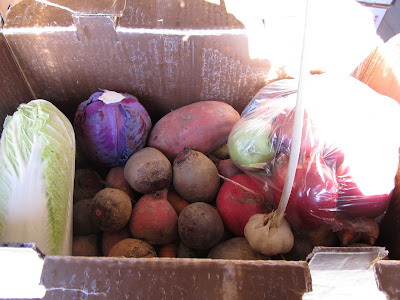The subject was raised during one of my workshops about eating fruits and vegetables seasonally. My clients wanted to know what was available for them to purchase during the cold winter months, especially since nothing can be harvested from the snow covered farm fields. Of course, freshly picked produce offers the most nutrients and enzymes. Unfortunately, most farms are closed here on Long Island for the winter season. There are a few farms that do have winter CSA’s that you can join if you remember to sign up during the fall. I joined Sang Lee Farms winter share program. I get one 27lb or so box of vegetables and fruit (usually apples) every three weeks. Most of the items are from cold storage, but what do you expect…it’s the middle of winter! Cold storage does help retain nutrient levels and is better than the alternative, purchasing everything at a grocery store, most of which has traveled hundreds if not thousands of miles to get there.
If you have no local farm produce available to you, visit your local health food store or Whole Foods to purchase your produce. Of course, always look for organic fruits and/or vegetables. If you look for the winter produce items I have listed below, you will probably find they have the best prices since they are “in season.” Please put down that $6.00 quart of strawberries. There is no reason to eat a strawberry in the middle of winter, since it probably came from thousands of miles away and has already lost most of its nutrient content. You would probably do better buying a bag of frozen strawberries, if you really needed them. At least, they were frozen directly after being picked and most of the nutrients would still be intact. Of course, you can preserve your own summer bounty and eat it during the winter season. Otherwise, stick to locating what is the most fresh. Here’s what you should look for in the North East this time of the year……
WINTER PRODUCE CHART - NORTHEAST |
Apples Beets Broccoli Cranberries Leeks Mushrooms Onions Parsnips Pears Potatoes Winter Squash |
***Some fruits and vegetables can be “cold stored” for the winter months. Some of these include: apples, beets, cabbage, carrots, onions and potatoes.
 |
| http://www.sangleefarms.com/ |




No comments:
Post a Comment